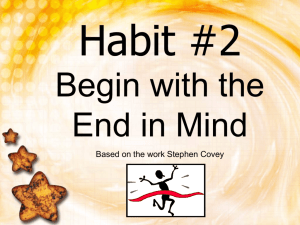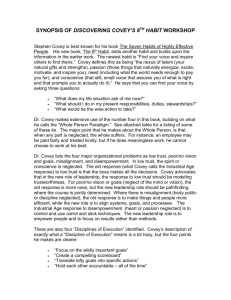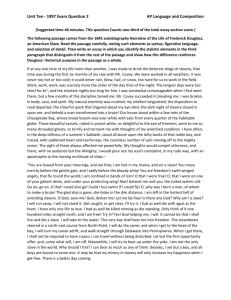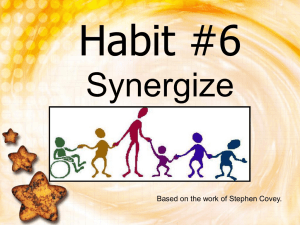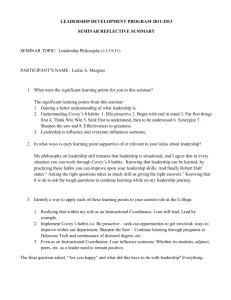Douglass Text
advertisement
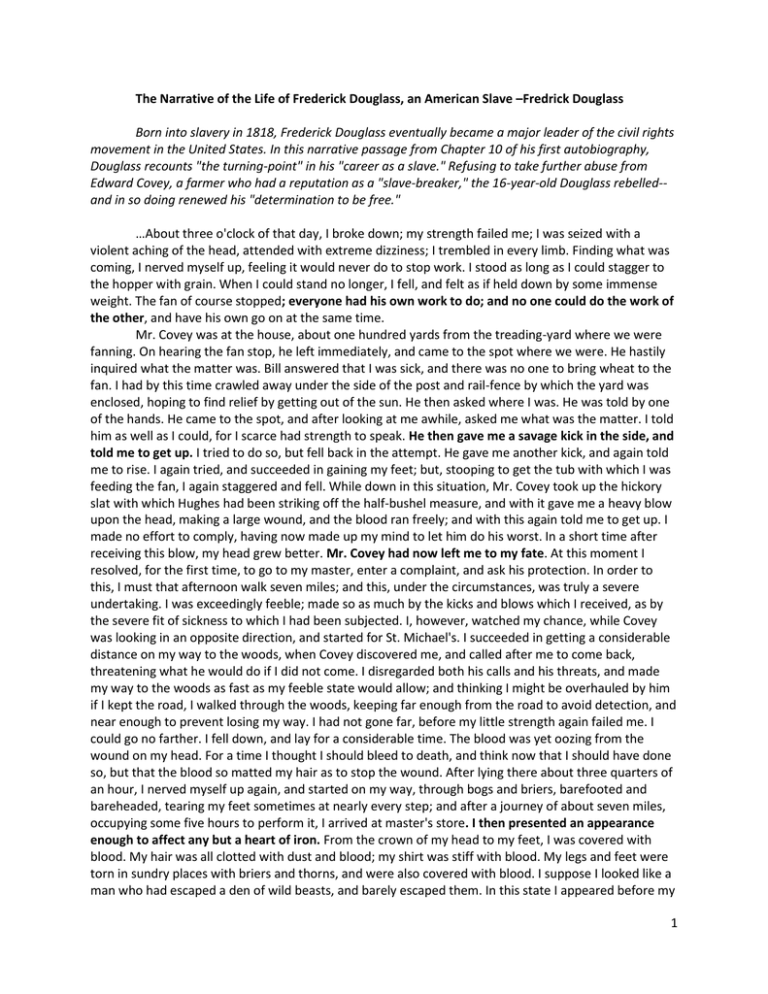
The Narrative of the Life of Frederick Douglass, an American Slave –Fredrick Douglass Born into slavery in 1818, Frederick Douglass eventually became a major leader of the civil rights movement in the United States. In this narrative passage from Chapter 10 of his first autobiography, Douglass recounts "the turning-point" in his "career as a slave." Refusing to take further abuse from Edward Covey, a farmer who had a reputation as a "slave-breaker," the 16-year-old Douglass rebelled-and in so doing renewed his "determination to be free." …About three o'clock of that day, I broke down; my strength failed me; I was seized with a violent aching of the head, attended with extreme dizziness; I trembled in every limb. Finding what was coming, I nerved myself up, feeling it would never do to stop work. I stood as long as I could stagger to the hopper with grain. When I could stand no longer, I fell, and felt as if held down by some immense weight. The fan of course stopped; everyone had his own work to do; and no one could do the work of the other, and have his own go on at the same time. Mr. Covey was at the house, about one hundred yards from the treading-yard where we were fanning. On hearing the fan stop, he left immediately, and came to the spot where we were. He hastily inquired what the matter was. Bill answered that I was sick, and there was no one to bring wheat to the fan. I had by this time crawled away under the side of the post and rail-fence by which the yard was enclosed, hoping to find relief by getting out of the sun. He then asked where I was. He was told by one of the hands. He came to the spot, and after looking at me awhile, asked me what was the matter. I told him as well as I could, for I scarce had strength to speak. He then gave me a savage kick in the side, and told me to get up. I tried to do so, but fell back in the attempt. He gave me another kick, and again told me to rise. I again tried, and succeeded in gaining my feet; but, stooping to get the tub with which I was feeding the fan, I again staggered and fell. While down in this situation, Mr. Covey took up the hickory slat with which Hughes had been striking off the half-bushel measure, and with it gave me a heavy blow upon the head, making a large wound, and the blood ran freely; and with this again told me to get up. I made no effort to comply, having now made up my mind to let him do his worst. In a short time after receiving this blow, my head grew better. Mr. Covey had now left me to my fate. At this moment I resolved, for the first time, to go to my master, enter a complaint, and ask his protection. In order to this, I must that afternoon walk seven miles; and this, under the circumstances, was truly a severe undertaking. I was exceedingly feeble; made so as much by the kicks and blows which I received, as by the severe fit of sickness to which I had been subjected. I, however, watched my chance, while Covey was looking in an opposite direction, and started for St. Michael's. I succeeded in getting a considerable distance on my way to the woods, when Covey discovered me, and called after me to come back, threatening what he would do if I did not come. I disregarded both his calls and his threats, and made my way to the woods as fast as my feeble state would allow; and thinking I might be overhauled by him if I kept the road, I walked through the woods, keeping far enough from the road to avoid detection, and near enough to prevent losing my way. I had not gone far, before my little strength again failed me. I could go no farther. I fell down, and lay for a considerable time. The blood was yet oozing from the wound on my head. For a time I thought I should bleed to death, and think now that I should have done so, but that the blood so matted my hair as to stop the wound. After lying there about three quarters of an hour, I nerved myself up again, and started on my way, through bogs and briers, barefooted and bareheaded, tearing my feet sometimes at nearly every step; and after a journey of about seven miles, occupying some five hours to perform it, I arrived at master's store. I then presented an appearance enough to affect any but a heart of iron. From the crown of my head to my feet, I was covered with blood. My hair was all clotted with dust and blood; my shirt was stiff with blood. My legs and feet were torn in sundry places with briers and thorns, and were also covered with blood. I suppose I looked like a man who had escaped a den of wild beasts, and barely escaped them. In this state I appeared before my 1 master, humbly entreating him to interpose his authority for my protection. I told him all the circumstances as well as I could, and it seemed, as I spoke, at times to affect him. He would then walk the floor, and seek to justify Covey by saying he expected I deserved it. He asked me what I wanted. I told him to let me get a new home; that as sure as I lived with Mr. Covey again, I should live with but to die with him; that Covey would surely kill me he was in a fair way for it. Master Thomas ridiculed the idea that there was any danger of Mr. Covey's killing me, and said that he knew Mr. Covey; that he was a good man, and that he could not think of taking me from him; that should he do so, he would lose the whole year's wages; that I belonged to Mr. Covey for one year, and that I must go back to him, come what might; and that I must not trouble him with any more stories, or that he would himself get hold of me. After threatening me thus, he gave me a very large dose of salts, telling me that I might remain in St. Michael's that night, (it being quite late,) but that I must be off back to Mr. Covey's early in the morning; and that if I did not, he would get hold of me, which meant that he would whip me. I remained all night, and according to his orders, I started off to Covey's in the morning, (Saturday morning,) wearied in body and broken in spirit. I got no supper that night, or breakfast that morning. I reached Covey's about nine o'clock; and just as I was getting over the fence that divided Mrs. Kemp's fields from ours, out ran Covey with his cowskin, to give me another whipping. Before he could reach me, I succeeded in getting to the cornfield; and as the corn was very high, it afforded me the means of hiding. He seemed very angry, and searched for me a long time. My behavior was altogether unaccountable. He finally gave up the chase, thinking, I suppose, that as I must come home for something to eat; he would give himself no further trouble in looking for me. I spent that day mostly in the woods, having the alternative before me, to go home and be whipped to death, or stay in the woods and be starved to death. That night, I fell in with Sandy Jenkins, a slave with whom I was somewhat acquainted. Sandy had a free wife, who lived about four miles from Mr. Covey's; and it being Saturday, he was on his way to see her. I told him my circumstances, and he very kindly invited me to go home with him. I went home with him, and talked this whole matter over, and got his advice as to what course it was best for me to pursue. I found Sandy an old adviser. He told me, with great solemnity, I must go back to Covey; but that before I went, I must go with him into another part of the woods, where there was a certain root, which, if I would take some of it with me, carrying it always on my right side, would render it impossible for Mr, Covey, or any other white man, to whip me. He said he had carried it for years; and since he had done so, he had never received a blow, and never expected to, while he carried it. I at first rejected the idea, that the simple carrying of a root in my pocket would have any such effect as he had said, and was not disposed to take it; but Sandy impressed the necessity with much earnestness, telling me it could do no harm, if it did no good. To please him, I at length took the root, and, according to his direction, carried it upon my right side. This was Sunday morning. I immediately started for home; and upon entering the yard gate, out came Mr. Covey on his way to meeting. He spoke to me very kindly, bade me drive the pigs from a lot near by, and passed on towards the church. Now this singular conduct of Mr. Covey really made me begin to think that there was something in the root which Sandy had given me; and had it been on any other day than Sunday, I could have attributed the conduct to no other cause than the influence of that root; and as it was, I was half inclined to think the root to be something more than I at first had taken it to be. All went well till Monday morning. On this morning, the virtue of the root was fully tested. Long before daylight, I was called to go and rub, curry, and feed the horses. I obeyed, and was glad to obey. But whilst thus engaged, whilst in the act of throwing down some blades from the loft, Mr. Covey entered the stable with a long rope; and just as I was half out of the loft, he caught hold of my legs, and was about tying me. As soon as I found what he was up to, I gave a sudden spring, and as I did so, he holding to my legs, I was brought sprawling on the stable floor. Mr. Covey seemed now to think he had me, and could do what he pleased; but at this moment from whence came the spirit I don't know I resolved to fight; 2 and suiting my action to the resolution, I seized Covey hard by the throat; and as I did so, I rose. He held on to me, and I to him. My resistance was so entirely unexpected, that Covey seemed taken all aback. He trembled like a leaf. This gave me assurance, and I held him uneasy, causing the blood to run where I touched him with the ends of my fingers. Mr. Covey soon called out to Hughes for help. Hughes came, and, while Covey held me, attempted to tie my right hand. While he was in the act of doing so, I watched my chance, and gave him a heavy kick close under the ribs. This kick fairly sickened Hughes, so that he left me in the hands of Mr. Covey. This kick had the effect of not only weakening Hughes, but Covey also. When he saw Hughes bending over with pain, his courage quailed. He asked me if I meant to persist in my resistance. I told him I did, come what might; that he had used me like a brute for six months, and that I was determined to be used so no longer. With that, he strove to drag me to a stick that was lying just out of the stable door. He meant to knock me down. But just as he was leaning over to get the stick, I seized him with both hands by his collar, and brought him by a sudden snatch to the ground. By this time, Bill came. Covey called upon him for assistance. Bill wanted to know what he could do. Covey said, "Take hold of him, take hold of him!" Bill said his master hired him out to work, and not to help to whip me; so he left Covey and myself to fight our own battle out. We were at it for nearly two hours. Covey at length let me go, puffing and blowing at a great rate, saying that if I had not resisted, he would not have whipped me half so much. The truth was, that he had not whipped me at all. I considered him as getting entirely the worst end of the bargain; for he had drawn no blood from me, but I had from him. The whole six months afterwards, that I spent with Mr. Covey, he never laid the weight of his finger upon me in anger. He would occasionally say, he didn't want to get hold of me again. "No," thought I, "you need not; for you will come off worse than you did before." This battle with Mr. Covey was the turning-point in my career as a slave. It rekindled the few expiring embers of freedom, and revived within me a sense of my own manhood. It recalled the departed self-confidence, and inspired me again with a determination to be free. The gratification afforded by the triumph was a full compensation for whatever else might follow, even death itself. He only can understand the deep satisfaction which I experienced, who has himself repelled by force the bloody arm of slavery. I felt as I never felt before. It was a glorious resurrection from the tomb of slavery to the heaven of freedom. My long-crushed spirit rose, cowardice departed, bold defiance took its place; and I now resolved that, however long I might remain a slave in form, the day had passed forever when I could be a slave in fact. I did not hesitate to let it be known of me, that the white man who expected to succeed in whipping, must also succeed in killing me. From this time I was never again what might be called fairly whipped, though I remained a slave four years afterwards. I had several fights, but was never whipped. "The Meaning of July Fourth for the Negro" 1852 On July 5, 1852, Douglass gave a speech at an event commemorating the signing of the Declaration of Independence Fellow Citizens, I am not wanting in respect for the fathers of this republic. The signers of the Declaration of Independence were brave men. They were great men, too Ñ great enough to give frame to a great age. It does not often happen to a nation to raise, at one time, such a number of truly great men. The point from which I am compelled to view them is not, certainly, the most favorable; and yet I cannot contemplate their great deeds with less than admiration. They were statesmen, patriots and heroes, and for the good they did, and the principles they contended for, I will unite with you to honor their memory.... ...Fellow-citizens, pardon me, allow me to ask, why am I called upon to speak here to-day? What have I, or those I represent, to do with your national independence? Are the great principles of political freedom and of natural justice, embodied in that Declaration of Independence, extended to us? and am I, 3 therefore, called upon to bring our humble offering to the national altar, and to confess the benefits and express devout gratitude for the blessings resulting from your independence to us? Would to God, both for your sakes and ours, that an affirmative answer could be truthfully returned to these questions! Then would my task be light, and my burden easy and delightful. For who is there so cold, that a nation's sympathy could not warm him? Who so obdurate and dead to the claims of gratitude, that would not thankfully acknowledge such priceless benefits? Who so stolid and selfish, that would not give his voice to swell the hallelujahs of a nation's jubilee, when the chains of servitude had been torn from his limbs? I am not that man. In a case like that, the dumb might eloquently speak, and the "lame man leap as an hart." But such is not the state of the case. I say it with a sad sense of the disparity between us. I am not included within the pale of glorious anniversary! Your high independence only reveals the immeasurable distance between us. The blessings in which you, this day, rejoice, are not enjoyed in common.ÑThe rich inheritance of justice, liberty, prosperity and independence, bequeathed by your fathers, is shared by you, not by me. The sunlight that brought light and healing to you, has brought stripes and death to me. This Fourth July is yours, not mine. You may rejoice, I must mourn. To drag a man in fetters into the grand illuminated temple of liberty, and call upon him to join you in joyous anthems, were inhuman mockery and sacrilegious irony. Do you mean, citizens, to mock me, by asking me to speak to-day? If so, there is a parallel to your conduct. And let me warn you that it is dangerous to copy the example of a nation whose crimes, towering up to heaven, were thrown down by the breath of the Almighty, burying that nation in irrevocable ruin! I can to-day take up the plaintive lament of a peeled and woe-smitten people! "By the rivers of Babylon, there we sat down. Yea! we wept when we remembered Zion. We hanged our harps upon the willows in the midst thereof. For there, they that carried us away captive, required of us a song; and they who wasted us required of us mirth, saying, Sing us one of the songs of Zion. How can we sing the Lord's song in a strange land? If I forget thee, 0 Jerusalem, let my right hand forget her cunning. If I do not remember thee, let my tongue cleave to the roof of my mouth." Fellow-citizens, above your national, tumultuous joy, I hear the mournful wail of millions! whose chains, heavy and grievous yesterday, are, to-day, rendered more intolerable by the jubilee shouts that reach them. If I do forget, if I do not faithfully remember those bleeding children of sorrow this day, "may my right hand forget her cunning, and may my tongue cleave to the roof of my mouth!" To forget them, to pass lightly over their wrongs, and to chime in with the popular theme, would be treason most scandalous and shocking, and would make me a reproach before God and the world. My subject, then, fellow-citizens, is American slavery. I shall see this day and its popular characteristics from the slave's point of view. Standing there identified with the American bondman, making his wrongs mine, I do not hesitate to declare, with all my soul, that the character and conduct of this nation never looked blacker to me than on this 4th of July! Whether we turn to the declarations of the past, or to the professions of the present, the conduct of the nation seems equally hideous and revolting. America.is false to the past, false to the present, and solemnly binds herself to be false to the future. Standing with God and the crushed and bleeding slave on this occasion, I will, in the name of humanity which is outraged, in the name of liberty which is fettered, in the name of the constitution and the Bible which are disregarded and trampled upon, dare to call in question and to denounce, with all the emphasis I can command, everything that serves to perpetuate slavery Ñ the great sin and shame of America! "I will not equivocate; I will not excuse"; I will use the severest language I can command; and yet not one word shall escape me that any man, whose judgment is not blinded by prejudice, or who is not at heart a slaveholder, shall not confess to be right and just. But I fancy I hear some one of my audience say, "It is just in this circumstance that you and your brother abolitionists fail to make a favorable impression on the public mind. Would you argue more, an denounce less; would you persuade more, and rebuke less; your cause would be much more likely to succeed." But, I submit, where all is plain there is nothing to be argued. What point in the anti-slavery creed would you have me argue? On what branch of the subject do the people of this country need light? Must I undertake to prove that the slave is a man? That point is conceded already. Nobody doubts it. The slaveholders themselves acknowledge it in the enactment of laws for their government. They 4 acknowledge it when they punish disobedience on the part of the slave. There are seventy-two crimes in the State of Virginia which, if committed by a black man (no matter how ignorant he be), subject him to the punishment of death; while only two of the same crimes will subject a white man to the like punishment. What is this but the acknowledgment that the slave is a moral, intellectual, and responsible being? The manhood of the slave is conceded. It is admitted in the fact that Southern statute books are covered with enactments forbidding, under severe fines and penalties, the teaching of the slave to read or to write. When you can point to any such laws in reference to the beasts of the field, then I may consent to argue the manhood of the slave. When the dogs in your streets, when the fowls of the air, when the cattle on your hills, when the fish of the sea, and the reptiles that crawl, shall be unable to distinguish the slave from a brute, then will I argue with you that the slave is a man! For the present, it is enough to affirm the equal manhood of the Negro race. Is it not astonishing that, while we are ploughing, planting, and reaping, using all kinds of mechanical tools, erecting houses, constructing bridges, building ships, working in metals of brass, iron, copper, silver and gold; that, while we are reading, writing and ciphering, acting as clerks, merchants and secretaries, having among us lawyers, doctors, ministers, poets, authors, editors, orators and teachers; that, while we are engaged in all manner of enterprises common to other men, digging gold in California, capturing the whale in the Pacific, feeding sheep and cattle on the hill-side, living, moving, acting, thinking, planning, living in families as husbands, wives and children, and, above all, confessing and worshipping the Christian's God, and looking hopefully for life and immortality beyond the grave, we are called upon to prove that we are men! Would you have me argue that man is entitled to liberty? that he is the rightful owner of his own body? You have already declared it. Must I argue the wrongfulness of slavery? Is that a question for Republicans? Is it to be settled by the rules of logic and argumentation, as a matter beset with great difficulty, involving a doubtful application of the principle of justice, hard to be understood? How should I look to-day, in the presence of Amercans, dividing, and subdividing a discourse, to show that men have a natural right to freedom? speaking of it relatively and positively, negatively and affirmatively. To do so, would be to make myself ridiculous, and to offer an insult to your understanding. There is not a man beneath the canopy of heaven that does not know that slavery is wrong for him. What, am I to argue that it is wrong to make men brutes, to rob them of their liberty, to work them without wages, to keep them ignorant of their relations to their fellow men, to beat them with sticks, to flay their flesh with the lash, to load their limbs with irons, to hunt them with dogs, to sell them at auction, to sunder their families, to knock out their teeth, to burn their flesh, to starve them into obedience and submission to their mastcrs? Must I argue that a system thus marked with blood, and stained with pollution, is wrong? No! I will not. I have better employment for my time and strength than such arguments would imply. What, then, remains to be argued? Is it that slavery is not divine; that God did not establish it; that our doctors of divinity are mistaken? There is blasphemy in the thought. That which is inhuman, cannot be divine! Who can reason on such a proposition? They that can, may; I cannot. The time for such argument is passed. At a time like this, scorching irony, not convincing argument, is needed. O! had I the ability, and could reach the nation's ear, I would, to-day, pour out a fiery stream of biting ridicule, blasting reproach, withering sarcasm, and stern rebuke. For it is not light that is needed, but fire; it is not the gentle shower, but thunder. We need the storm, the whirlwind, and the earthquake. The feeling of the nation must be quickened; the conscience of the nation must be roused; the propriety of the nation must be startled; the hypocrisy of the nation must be exposed; and its crimes against God and man must be proclaimed and denounced. What, to the American slave, is your 4th of July? I answer; a day that reveals to him, more than all other days in the year, the gross injustice and cruelty to which he is the constant victim. To him, your celebration is a sham; your boasted liberty, an unholy license; your national greatness, swelling vanity; your sounds of rejoicing are empty and heartless; your denunciation of tyrants, brass fronted impudence; your shouts of liberty and equality, hollow mockery; your prayers and hymns, your sermons and 5 thanksgivings, with all your religious parade and solemnity, are, to Him, mere bombast, fraud, deception, impiety, and hypocrisy -- a thin veil to cover up crimes which would disgrace a nation of savages.There is not a nation on the earth guilty of practices more shocking and bloody than are the people of the United States, at this very hour. Go where you may, search where you will, roam through all the monarchies and despotisms of the Old World, travel through South America, search out every abuse, and when you have found the last, lay your facts by the side of the everyday practices of this nation, and you will say with me, that, for revolting barbarity and shameless hypocrisy, America reigns without a rival.... ...Allow me to say, in conclusion, notwithstanding the dark picture I have this day presented, of the state of the nation, I do not despair of this country. There are forces in operation which must inevitably work the downfall of slavery. "The arm of the Lord is not shortened," and the doom of slavery is certain. I, therefore, leave off where I began, with hope. While drawing encouragement from "the Declaration of Independence," the great principles it contains, and the genius of American Institutions, my spirit is also cheered by the obvious tendencies of the age. Nations do not now stand in the same relation to each other that they did ages ago. No nation can now shut itself up from the surrounding world and trot round in the same old path of its fathers without interference. The time was when such could be done. Long established customs of hurtful character could formerly fence themselves in, and do their evil work with social impunity. Knowledge was then confined and enjoyed by the privileged few, and the multitude walked on in mental darkness. But a change has now come over the affairs of mankind. Walled cities and empires have become unfashionable. The arm of commerce has borne away the gates of the strong city. Intelligence is penetrating the darkest corners of the globe. It makes its pathway over and under the sea, as well as on the earth. Wind, steam, and lightning are its chartered agents. Oceans no longer divide, but link nations together. From Boston to London is now a holiday excursion. Space is comparatively annihilated. -- Thoughts expressed on one side of the Atlantic are distinctly heard on the other. The far off and almost fabulous Pacific rolls in grandeur at our feet. The Celestial Empire, the mystery of ages, is being solved. The fiat of the Almighty, "Let there be Light," has not yet spent its force. No abuse, no outrage whether in taste, sport or avarice, can now hide itself from the all-pervading light. The iron shoe, and crippled foot of China must be seen in contrast with nature. Africa must rise and put on her yet unwoven garment. 'Ethiopia, shall, stretch. out her hand unto Ood." In the fervent aspirations of William Lloyd Garrison, I say, and let every heart join in saying it: God speed the year of jubilee The wide world o'er! When from their galling chains set free, Th' oppress'd shall vilely bend the knee, And wear the yoke of tyranny Like brutes no more. That year will come, and freedom's reign, To man his plundered rights again Restore. God speed the day when human blood Shall cease to flow! In every clime be understood, The claims of human brotherhood, And each return for evil, good, Not blow for blow; That day will come all feuds to end, And change into a faithful friend 6 Each foe. God speed the hour, the glorious hour, When none on earth Shall exercise a lordly power, Nor in a tyrant's presence cower; But to all manhood's stature tower, By equal birth! That hour will come, to each, to all, And from his Prison-house, to thrall Go forth. Until that year, day, hour, arrive, With head, and heart, and hand I'll strive, To break the rod, and rend the gyve, The spoiler of his prey deprive – So witness Heaven! And never from my chosen post, Whate'er the peril or the cost, Be driven. 7
